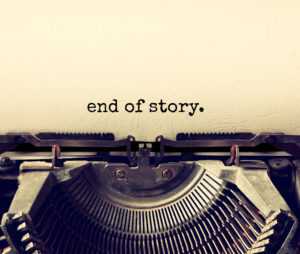Jerry B. Jenkins's Blog, page 20
November 15, 2016
How to Repair the End of Your Novel
 What’s worse than knowing your story’s final act doesn’t work?
What’s worse than knowing your story’s final act doesn’t work?
You might be satisfied with everything else—your Beginning is stellar, and you even survived the marathon of the Middle by maintaining that page-turning quality.
But you don’t want anyone to even see your manuscript until you’re happy with all three foundational elements—Beginning, Middle, and End. And the End is blah if it even exists yet.
I’ve been there. In fact, I’m still there—with the writing of every novel. The one thing as hard as getting started is bringing your story’s final curtain down with a satisfying thud.
I can feel good about 95% of my story, but often the end simply won’t come together for me. Despite tens of millions of sales and more than 20 New York Times bestsellers, that makes me wonder why I ever thought I could do this.
Don’t Quit!
After countless grueling hours on the rest of it, suddenly stalling at the end makes you want to give up. But I’ll never do that, and you won’t either if you’re committed to success.
Because I have good news. There’s a way to fix your ending without scrapping all your hard work.
I’ve scratched and clawed to produce endings agents, editors, and readers enjoy—and I have distilled my method so you can use it to give your novel the finish it deserves.
You know finish is also the word we use for what we apply to a surface to make it shine.
That’s the perfect metaphor for my method.
How to Get Unstuck
Being a Pantser (writing by the seat of my pants), as opposed to an Outliner who plots his story first, I write by process of discovery. I try to put interesting characters in difficult situations and write to find out what happens.
I have an idea where I’m going, and when everything goes as it should, the End crystallizes more the closer I get to it.
But most of the time I discover the story as I go, letting my characters speak to me. That should keep my stuff from being predictable, because the reader can’t guess what’s going to happen if I don’t even know.
The downside is that the End I thought I was heading for has now become a mirage. It gets farther from me the more I race toward it, and then it morphs into a mess of loose threads and illogic.
Now what?
Here’s how I get unstuck:
Step 1: Step away.
Sometimes you simply need to let things simmer. I might take a walk, or find somewhere to sit outside. That satisfying End I know exists is likely lurking in my subconscious—which works 24/7 whether I’m writing, procrastinating, or sleeping.
But the subconscious will not be nagged. It demands patience and diplomacy. (I know how weird that sounds, but maybe you can identify.)
Have you heard of creative types hit with a stroke of brilliance while in the shower? Some say that’s because warm water is massaging, stimulating, the brain.
Some of my best ideas come not from concentrating harder, but from stopping to rest.
Step 2: Reread your novel, then sleep on it.
Just start from the beginning and read everything you’ve written so far—without editing (that crucial stage will come). Even if you’re a Pantser, there’s no rule against taking notes now. Your goal is to get a handle on the scope and flow of your story.
Then sleep on it. My subconscious seems to work hard when I’m not, um, conscious (sorry).
If you’re like me, some time the next day—particularly if you don’t rush this or stress over it— something will click in your brain, and you’ll be ready to get back to the keyboard.
Attributes of a Killer Ending
A great ending:
Logically ties loose ends
Tells the truth (not everyone always lives happily ever after)
Satisfies, paying off by resolving the problem established from the beginning
Surprises while also feeling somehow inevitable
Resounds like the curtain at the end of a fantastic performance
To read more secrets to writing a captivating ending, check out this post.
Don’t Transmit Your Novel Until You’re Happy With Every Word
Doubts? Hesitation? Wondering if a passage, a description, some dialogue, a bit of character development is the best it can be? Stay at it till you’re thrilled with it.
Do you have other tips for writing a great ending? Let me know in the comments.
The post How to Repair the End of Your Novel appeared first on Jerry Jenkins | Write Your Book.
November 8, 2016
How to Stay Focused on Writing (Even if You’re Easily Distracted)
 It happens to us all.
It happens to us all.
You sit to write, and distractions flood you:
Someone asks you to run an errand, “…since you’re not really working.”
An email demands immediate response.
That person you’ve been trying to reach finally calls.
Facebook hooks you with an irresistible headline (“What she did next will leave you speechless!”)
You had finally gotten yourself before the keyboard, and now your day has been washed out.
What are you to do—how are you to keep writing?
Keep your big kid pants on. Successful writers find a way.
Only you can take control of your limited time.
Sure, you’ve got other important things going on—your job, relationships, and myriad miscellaneous commitments.
We all have 168 hours in a week. So what are you to do?
Through the years, I’ve had to develop a system to keep me focused, even though my schedule is as packed as yours:
How to Reduce Distraction and Stay Focused on Writing
1. Listen to counsel
My wife understands my time and energy capacity better than I do. I bounce opportunities off her, and where I might see an opening on the calendar and say, “Why not?” she will say, “You might want to keep that open for downtime. Your plate’s too full.”
Her counsel is invaluable because she’s almost always right—and she always has my best interest in mind. Knowing I have her built-in gauge on my schedule allows me to focus on writing.
2. Form a personal accountability board
Mine consists of a pastor friend, a personal friend, and my eldest son. We each live in a different time zone and represent a different stage of life (one of us is in his 40s, another his 50s, another his 60s, and the other his 70s). We have a monthly conference call, during which they ask probing questions, challenge me, and make me justify my life decisions.
Imagine the sense of peace that gives me, knowing that three people who care about me have my back. That makes me want to redeem every minute before the computer screen.
Think of who might be best at keeping you accountable and see if they’ll play that role. You might be surprised to find they’d be honored. If nothing else, perhaps they’ll do what my guys do and keep you grounded. It’s hard to get too full of yourself when your friends feel free to question your motives.
I tell my board of my deadlines, and they’re not afraid to monitor my progress. That’s quite a motivator to keep focused. You might start with one friend and make yourselves mutually accountable.
3. Become a compartmentalizer
I schedule blocks of time each day for entirely separate tasks. When it’s time to devote yourself to someone for the sake of the relationship—whether your spouse or child or friend—do only that. No cell phone. No jotting yourself a reminder about your book. Compartmentalize.
If you’re writing from 8 to 10 in the morning and then from 10 to 11 plan to prepare for the meeting of a committee you’re on, keep those separate. When you’re writing, use an app like Freedom, turn off your social media and email, resolve not to answer the phone, and give yourself to your work.
Then treat your committee meeting preparation the same way. Give it your full attention, no daydreaming about your plot or taking “just a second” to check email. Social media and surfing the net should be relegated to their own block of time. Work before you play, and you can play without guilt.
List the things you must accomplish each day, and move from the most difficult to the easiest. Allot each the compartment of time it deserves, and you’ll find yourself focused and productive.
4. Guard your writing time
I don’t know about you, but writing remains the most difficult thing I’ll do all day. So it comes first on my list of priorities. Finish what you intend to do at the keyboard each day and you’ll be motivated to tick off everything else on your list too.
How do you respectfully keep others from violating your writing time?
Be sure your family, and anyone else who lives with you, knows your writing schedule and that you are unavailable during that time. I have a friend who tells people, “I don’t want to be interrupted except for news of someone’s death, and it had better be yours.”
 And my wife hung this sign over my writing cave door:
And my wife hung this sign over my writing cave door:
If your social media and phone are off during writing time, that takes care of those intrusions. If you hate to appear unresponsive, consider an automated reply that tells anyone emailing you that you answer messages at a certain time each day, and thank them for their patience and understanding.
In a corporate setting, your superiors help set such boundaries. In your freelance writing career no one will protect your borders but you. When you take them seriously, others will too.
Get Focused and Finish Your Book
Follow these steps and you will multiply your chances of finally finishing that book.
Whatever your message, if you didn’t think the world needed to hear it, you wouldn’t be writing. But in this busiest age in history, you know how easily it could get away from you and never get finished. Unless you learn to focus.
What do you do to stay focused—any strategies different from mine? Let me know in the comments below.
The post How to Stay Focused on Writing (Even if You’re Easily Distracted) appeared first on Jerry Jenkins | Write Your Book.
November 1, 2016
How to Write Short Stories: 3 Uncommon Tips to Captivate Your Readers
 Have you ever jumped into a new hobby hoping to be an expert from day one?
Have you ever jumped into a new hobby hoping to be an expert from day one?
I have. Didn’t take time to learn the basics, ignored the fundamentals, and started without a real foundation.
You can guess the results—fall-on-my-face failure.
I didn’t allow myself to be bad as a beginner and eventually learn and grow. I was going for expert status from the get-go.
And I suffered the consequences.
I see beginning fiction writers do this every day.
They want start their careers by writing a novel, before learning the craft.
A book is not where you start—it’s where you arrive.
So how should a fiction writer begin? How about learning how to write short stories, or flash fiction, or anything shorter than 400 pages?
Start on your full-length masterpiece without any training, practice, or knowledge, and we both know how that’s going to turn out.
Learning how to write short stories is the perfect place to begin.
It allows you some quick wins as you finish a few and gain momentum as a writer—all before trying to tackle an overwhelming book project.
But there’s an art to writing short stories—they’re vastly different from full-length novels.
To get your feet wet as a short story writer, follow these steps:
1. Read as Many Great Short Stories as You Can Find
Read hundreds of them—especially the classics.
You learn this genre only by observing the best. See yourself as an apprentice. Watch, evaluate, analyze the experts, then try to emulate their work. Soon you’ll learn enough about short stories that you can start developing your own style.
My recommendation? Learn how to write short stories from Bret Lott, a modern-day master. I’ve actually had one of my short stories chosen for one of his collections, so I had the privilege of interacting with him in his acquiring editor role.
After reading at least a dozen short stories, you should start to catch on to their structure and style. That should ignite your imagination so you can produce one while you’re reading dozens more.
Remember, you won’t likely start out with something sensational, but the tools you’ve collected will push your confidence to the limit. You’ll be on your way.
2. Tell the Story—and Leave Everything Else Out
Extraneous details will destroy your effort.
Short stories are, by definition, short—so stick to only vital information. As you’re writing, ask yourself:
“Is this setting/description/dialogue crucial to my plot?”
When in doubt, leave it out.
You want your reader to glide through your story.
3. Cut, Cut, Cut—Like Your Story’s Life Depends on It
Because it does.
When you’ve finished your first draft, your work has just begun. Once you’re happy with the basic story, now it’s time to examine the writing itself, sentence-by-sentence and word for word.
Tightening nearly always adds power. Declare war on needless words. Make every word count.
Slash like this:
She shruggedher shoulders.
He blinkedhis eyes.
Jim walked in through the open door and sat down in a chair.
The crowd clapped their handsand stomped their feet.
I call this becoming a ferocious self-editor. Learn to tighten, and you’ll learn how to write short stories that captivate your reader.
What’s Your Story?
Every story has the potential to change the world. Give yours that chance by learning how to write short stories, so yours won’t be left gathering dust in the attic of your mind.
You’ll know yours has potential when you can distill the idea to a single sentence. For instance, here’s one of mine:
An estranged son visits his lonely mother before his planned suicide, unaware she is planning the same, and the encounter gives them both reasons to go on.
In the comments below, give me the one-sentence essence of your short story.
The post How to Write Short Stories: 3 Uncommon Tips to Captivate Your Readers appeared first on Jerry Jenkins | Write Your Book.
October 21, 2016
4 Things Real Authors Have That Amateurs Don’t
 A guest post by Jeff Goins
A guest post by Jeff Goins
I find myself facing an uncomfortable experience common to many authors today. Every single day, I meet someone who thinks they can do my job.
“What do you do?” they ask.
“Oh,” I say, reluctantly, “I’m a writer.”
“Oh, really? What kind of songs do you write?”
I explain that I don’t write songs, at least not for a living, a common thing writers who live in Nashville have to explain.
“Oh,” they say, “what kind of books do you write?”
“Well,” I say with a chuckle, “none that you’ve probably heard of. I mean, I didn’t write Left Behind or anything.”
“Oh,” they say with disappointment obvious in their eyes. And then comes the line I hear almost daily: “I’ve always wanted to write a book.”
Ouch.
That’s the one that gets me. Because in no other vocation would you say such a thing. I would never say to my dentist, “Oh, I’ve always wanted to pull teeth.” And yet, for some reason, we think writing is something anyone can do. It can’t be that hard, can it? You just pick up a pencil and get to it.
Unfortunately, at least in my experience, it is that hard.
Maybe, though, I’m wrong. Certainly we see more and more people publishing books than ever before, with the advent of print-on-demand technology and digital self- publishing. Maybe anyone really can write a book.
But even if those people are right, even if they could write that book and get it published, they would not be writers. Why? Because it takes more than writing one book to be a writer.
A Way of Life, a Calling
Finishing a book, even one hastily thrown together during NaNoWriMo or in a bout of incredible discipline, is not what makes a writer. If popular opinion is right, anyone can write one book. But not everyone can be a writer, because being a writer is a way of life. It is a vocational choice, a calling.
That doesn’t mean you have to be rich or famous to be legitimate, but you have to take this thing seriously. I don’t mean it can’t be fun or whimsical. I just mean it needs to be something more than a bucket list item. That, in my opinion, is the difference between a one-time writer and a lifelong author. And of course, there’s nothing wrong with being the former. But writing one book is not the same as being a writer.
So let’s say you want to be a writer, a real one, not just someone who once wrote a book.
What’s your next step?
What it really takes to become a writer is you have to “turn pro,” in the words of Steven Pressfield. This is a mental shift. It’s simple but far from easy. You have to start taking your work so seriously that other people do the same.
This goes way beyond writing a book. You have to act the way real authors act, avoiding the path of the wannabe. And to do that, you’re going to need help.
Four Marks that Distinguish a Professional Writer From an Amateur
1. Real authors have a clear message.
Where amateurs confuse, professionals clarify. Real authors understand they aren’t writing just for themselves; they’re writing “with intent,” in the words of Marion Roach Smith.
Every word they write is for someone else, because the act of writing is inherently generous. You are sharing your gift with the world, and that means you have to write with an audience in mind – both clearly and concisely. And you have to make every word count.
So forget what you’ve heard about writing prompts and other wastes of time. The professional writes for real and with as much clarity as he can, every day of his life. Don’t settle for anything less.
2. Real authors have a platform.
What this means, in laymen’s terms, is a website. It doesn’t have to be a blog, but you have to own some place online where people can find you. Your Amazon page doesn’t count. Every pro understands this.
Steven King has a website. So does J.K. Rowling. As does Jerry Jenkins. Heck, even J.R.R. Tolkien has a website, and he died before the Internet became a thing.
You need a website – where people can learn about your work. This is called a platform, and every serious author – not those who once wrote a book – has one.
3. Real authors have a tribe.
Do you know what every writer wants but doesn’t realize she wants until she’s gotten everything else?
It’s not a bunch of money.
It’s not a prestigious title like “Pulitzer Prize winner” or “New York Times Bestseller,” either.
It’s far more simple but often more elusive:
Every writer wants a tribe. A small but dedicated group of readers who will read everything you put out. That’s what we all yearn for: to know that someone is really listening.
Flannery O’Connor said, “I write because I don’t know what I think until I read what I say.” And while it may be true that we write to figure things out for ourselves, we keep writing because someone is listening.
And how do you do this today? Simple. You build an email list. Through Mailchimp or Convertkit or whatever tool you want, set up a simple way to collect people’s addresses so you can update them once a week on what you’re working on.
Do this well and, in time, you will grow your audience. People will listen to what you have to say. And when you have a book to share, they pay attention and will buy it. This may not be a huge group, but it’s is enough to sustain you. “1000 true fans,” Kevin Kelly said, was the magic number for a creative person to make a living off his art. That’s all you need.
4. Real authors have multiple streams of income.
Amateurs expect to either strike it rich off their first book, or even worse, to never earn a dime.
Neither is accurate.
Most working writers I know have multiple and diverse streams of income. Some are speakers. Some sell online courses. Some do consulting or run a side business or have a day job. But very few just write books and make a living off their royalties.
Granted, some of them actually could do just that. But personally I would find that boring. It’s fun to engage your readers on different levels with offerings other than books. Of course, this isn’t for everyone, but if you don’t figure out a few different ways for people to pay you, then you may find it difficult to make a living as a writer.
But if you want to be a writer, not just someone who once wrote a book, this is essential.
The truth is that if you build a tribe – by creating a website, building an email list, and then serving that tribe with helpful, interesting, and even entertaining content – in the words of indie musician Amanda Palmer, you won’t have to worry about getting them to pay you. But you will have to let them.
A Year of Living Meagerly
After composing 400 blog posts in 365 days, I learned this lesson in a surprising way. I was tired. I’d hoped to be making money writing soon, but my prospects weren’t good. Lacking confidence, I was reluctant to ask my readers to buy anything, even a book. I was still waiting for a publisher to discover me.
But after that year of blogging and sharing my best ideas for free, I started getting emails from my readers. First it was one, then two, then several, and eventually hundreds. And they all, essentially, said the same thing:
“Hey, all this free stuff is great, but can I PAY you for something?”
So I conducted a survey asking what readers wanted and how much they were willing to pay for it. Then I offered it to them.
And that’s how I earned my first dollar as a writer, which became my first $1000, then my first $100,000.
I didn’t have to make people pay. But I did have to let them. And the truth is, an amateur never would have done that. It took a professional, someone committed to being a writer for the rest of his life, not just someone who once wrote a book.
So, Again…
What do you want to be – a real author, or just someone who once wrote a book?
Begin by taking yourself and your work seriously, then follow in the footsteps of those who have gone before you. It’s hard work, but in the words of my friend Sandy Kreps, it’s good work.
And if you need help figuring out where to start, look no further than this eBook I recently released which you can get for a limited time for free.
 Our guest blogger
Our guest blogger
Jeff Goins is the best-selling author of four books, including the national bestseller The Art of Work. He is also the founder of Tribe Writers, an online community and course for writers. Connect with him on his award-winning blog at Goinswriter.com or on Twitter @JeffGoins.
Jeff’s premiere audience-building course, Tribe Writers, is available until Wednesday, October 26. Click here to check it out.
Do you want to be an author, or someone who wrote a book once? Tell me in the comments below.
The post 4 Things Real Authors Have That Amateurs Don’t appeared first on Jerry Jenkins | Write Your Book.
October 18, 2016
Participating in NaNoWriMo 2016? Caution!
NaNoWriMo 2016 is right around the corner.
This wildly popular phenomenon, National Novel Writing Month , starts November 1, and you’re urged to write an entire novel by the end of the month.
, starts November 1, and you’re urged to write an entire novel by the end of the month.
Wouldn’t it be great to actually finish a 50,000-word novel in 30 days?
Since 1999, that very idea has inspired millions of writers from all over the world to embark on this journey.
Last year alone, more than 430,000 finished their manuscripts, and NaNoWriMo refers to them as novelists.
Sounds fabulous, right?
NaNoWriMo Benefits
Well, I can’t argue with the upsides:
The NaNoWriMo folks “believe stories matter.” So do I.
And in the last 17 years since this effort began, countless writers have raved to me that NaNoWriMo was the vehicle that finally motivated them to actually finish.
That’s no small thing. Over my four decades teaching writing, I’ve learned that the single most debilitating barrier to writers finishing writing their novels has been fear—fear that kills impetus.
I can’t count the number who have told me they can’t get started, let alone finish.
And as my film director son says about movies, simply producing one is a major accomplishment, let alone a good one. He compliments novice filmmakers for merely finishing.
The same is true about writing a novel.
So, yes, I’m all for anything that motivates a would-be novelist to start and (more importantly) to finish.
NaNoWriMo Downsides
However, I also have reservations.
Now, hear me, I’m not trying to talk you out of trying this. If it’s the trigger that results in your first finished novel, bravo!
But let’s take a closer look:
NaNoWriMo reports that over the years, 250 of its participants have seen their manuscripts sell to traditional publishing houses. That means the authors were paid to be published rather than paying to be printed.
Nothing to sneeze at. Until you do the math.
A rule of thumb in book publishing is that an unsolicited manuscript has about a 1 in 1,000 chance of landing a traditional book deal. While the figure may be unscientific, it’s not hyperbole.
That’s why I teach writing and publishing—so you can improve your odds.
What are the odds your NaNoWriMo 2016 manuscript will be traditionally published? Without knowing the total number of novels written since the effort began (this is its 17th year), it’s impossible to say.
But one thing I can say for certain: The odds are way worse than 1 in 1,000.
In fact, if every success story had happened last year alone—in other words, had all 250 published novels come from only the 431,626 NaNoWriMo manuscripts completed last year—your chances of ultimate success would be 1 in more than 1,725.
But those 250 traditionally published novels have come from all the NaNoWriMo manuscripts written since 1999. While not every year would have represented more than 400,000 writers, surely the total is in the millions.
My NaNoWriMo 2016 Caution?
As a writing coach, my goal is to help get your work to where it’s marketable to traditional publishers. That’s the sole purpose of this blog and The Jerry Jenkins Writers Guild. So, far be it from me to criticize a well-intentioned program like NaNoWriMo.
It appears to me their goal is not to see you finish a pristine manuscript ready for the marketplace. Their aim, and it’s a worthy one, is to encourage.
NaNoWriMo serves to prove to you that you can both start and finish a novel of at least 50,000 words. And that’s just what many writers need.
If you believe it would work for you, motivate you, get you to finally get going on your novel, I say go for it.
My caution is to not make more of the result than it deserves.
The benefit: You knock out a first draft.
The danger: You assume your work is done.
Bottom line: I applaud NaNoWriMo for what it’s meant to so many writers who need a deadline to finally finish novel manuscripts. I urge you to see the result as only that for now.
Finishing your novel doesn’t make you a novelist. You’re still an aspiring novelist, and I’d LOVE to see you fulfill your dream.
I’ve harped on this before: If getting traditionally published were easy, anyone could do it.
The last part of the process that can be done quickly is getting your first draft down. Just realize that if you were building a house, what you would have after a month of frenzied work is the foundation and shell.
Your novel’s foundation has been laid, and its studded shell is standing. Now how long will it take to wire it, plumb it, drywall it, trim it, paint it, and furnish it?
A lot longer than a month, I can tell you that. And I’ve averaged an output of four books a year since 1974.
Some things can’t—and simply shouldn’t—be rushed.
If you’re gearing up for next month’s NaNoWriMo 2016 challenge, I wish you the best. Check back here the first week of December for what to do next. My hope is that your foundation and frame are ready for a lot of finish work.
Will you participate in NaNoWriMo 2016? What will your writing schedule look like? Let me know in the comments below.
The post Participating in NaNoWriMo 2016? Caution! appeared first on Jerry Jenkins | Write Your Book.
October 3, 2016
When You’ve Lost Your Passion for Writing
 Are you slogging through the marathon of the middle of your book and feel you have no gas left in the tank?
Are you slogging through the marathon of the middle of your book and feel you have no gas left in the tank?
Or have you recently had to trash everything you’ve done and start back at square one?
Maybe the idea of writing your book so overwhelms you that you can’t picture ever finishing—which has kept you from even starting.
I can tell you from experience, you can rekindle a passion for writing—even when you want to quit.
Just look at Stephen King.
Ever notice he announces his retirement almost every time he finishes a huge book?
This from a guy who has written more than 60 novels (including 7 under the name Richard Bachman) and enjoys a net worth of over $400 million.
Even he comes to feel as if he’s finished, spent, unable to write another word.
After I had finished one of my own novels and couldn’t imagine ever wanting to write another word, I mentioned that to Stephen.
His response was priceless.
The Key to Reigniting Your Writing Passion
“Whatever you do,” Stephen said, “don’t make any decisions—or worse, any announcements—right now.”
He told me he finally learned to quit going public with his retirement declarations when he realized how short-lived were his exits. “Take some time for R&R,” he said. “Think about anything but writing.”
Stephen said he would kick back, do nothing, read, watch TV, and try to keep up with the news. And then an idea would form. It might be based on something real, something he’d heard or read, or it might come out of nowhere.
But it was always a what-if question.
What if it turned out that guy was an alien?
What if I were the only one who knew?
What if his wife…?
What if their child…?
Soon Stephen King would grow restless and feel that old stirring. And before he knew it, he was out of sorts until he returned to the keyboard, “suddenly un-retired.”
That conversation kept me from quitting, and just as he predicted, I was soon back at it.
Since thinking I could never write again or even want to, I’ve written several more books, running my total to 189 and counting.
Make no mistake, finishing each one so wholly empties me of any reserves, I still honestly believe I’m done.
But I don’t say that aloud, and neither do I make any decisions while in that state of emptiness. I get away and regroup, and that has proven to be the secret to staying motivated.
Don’t Give Up On Your Writing Dream
So don’t despair when discouragement has you paralyzed. And whatever you do, don’t quit. Stop forcing yourself to face that keyboard. Instead, realize this is all part of the journey.
Take a few weeks off. Take your mind off your book. Come back when fresh ideas draw you back, and you’ll find yourself writing with renewed motivation.
What rekindles your passion for writing? Tell me in the comments below.
The post When You’ve Lost Your Passion for Writing appeared first on Jerry Jenkins | Write Your Book.
September 13, 2016
If You Really Want to Make It as a Writer
 Guest post by Chris Fabry
Guest post by Chris Fabry
If you really want to make it as a writer, find somebody.
If you want to reach some level of success, as in “get published by a publisher,” find somebody.
If you are tired of dreaming alone, find somebody.
If your spouse doesn’t understand your obsession, don’t try to make them understand. Find somebody.
I can take you to the bookstore in Chicago where I first had the dream. I stood outside, looking over the titles in the window, and whispered, “Someday a book of mine is going to be on that shelf.”
But it was just a dream, and a lonely one. I was unknown in publishing circles. So I found somebody.
That “somebody” happened to be Jerry Jenkins. And to be honest, I’m not sure I found him as much as he found me, because I was timid, hesitant to share my dream with someone who had so many books under his belt.
Overcoming Insecurity
That’s the thing. Fear will hold you back from finding somebody to help you reach your dream.
Jerry and I were eating when I pushed some pages across the restaurant table and said something like, “I’m not interested in a bestseller, I just want to know if this is any good.”
What I wanted Jerry to say, what I hoped he would say, was, “Wow, you need to run right out to the nearest publisher and show this to them. This is fantastic! I’ve never seen words put together like this in my life!”
Instead, he looked hard at me and covered the top page with a hand. “If your stuff is good, why wouldn’t you want it to get out there?”
Fear, no doubt. Insecurity. I took a drink to soothe my suddenly parched throat.
He said, “I’m willing to help because I sense you’re serious, but I warn you, this is going to hurt.”
I assured him I was serious, and he wasn’t kidding. It did hurt.
Enduring the Pain
Jerry pulled out his red pen and started marking, rewriting, making lines, and drawing arrows. I was aghast.
Months later, after sending him a finely-honed story I was sure needed not one more edit, he drew a big black line through the first ten pages and wrote, “Here is your beginning.”
Losing those pages stung. But I was overwhelmed by the feeling that I had a beginning. He’d found something good. It was a start.
Instead of being discouraged, I was energized that he saw a beginning to my story that I hadn’t.
And that all happened because I found somebody.
I found somebody who had made mistakes, had become frustrated, hit a wall in their writing, written a lot of books, made a fair amount of money, and was still enthralled with the writing life.
I found somebody who had “been there” but wasn’t content to be there alone. He wanted to extend a hand to help someone behind him.
I found somebody who, years earlier, had found somebody.
Find and Be Found
My guess is that after you find somebody you’re going to want to be found by somebody else. Because helping people get their thoughts on the page and communicate through words is rewarding and gratifying.
It’s not too big a stretch to say that my new novel, The Promise of Jesse Woods, wouldn’t exist if I hadn’t found Jerry. His input in those early years provided the platform for me to run after this dream.
I found somebody. I wish the same for you and your writing dream.
The Guest Blogger

Chris Fabry is an award-winning author and host of the daily program Chris Fabry Live! on Moody Radio. He has written more than 70 books. His novels, which include Dogwood, June Bug, Almost Heaven, Not in the Heart, Borders of the Heart, Every Waking Moment, and The Promise of Jesse Woods, have won multiple awards.
Who is your Somebody? Share in the Comments below.
The post If You Really Want to Make It as a Writer appeared first on Jerry Jenkins | Write Your Book.
September 6, 2016
One Reason You Haven’t Finished Your Book Yet
Let me be clear:
This post is not intended to discourage you.
But I do want to shine a light on one of the most confidence-crushing problems keeping you from your keyboard.
The Problem Is Your Writing Schedule
If you’re not yet where you want to be, it could be because you’ve either:
Never established a writing schedule for yourself, or
Not kept your writing schedule sacred
Yes, it’s that simple.
And at the risk of being over-obvious, I have to say it: If you don’t finish writing, your book will never see the light of day.
Every successful author I know carves out time in their week to write.
They don’t find the time, and they don’t expect to. They know they have to make time.
Want to join their ranks? Do what they do.
‘But I’m Not a Scheduler!’
Maybe you see schedules as confining. Maybe you rage against them. I’ve been there. Many creatives are this way.
And too many remain unpublished.
My counsel? Get over it.
Get over your aversion to scheduling and sacrifice some TV shows, a concert, a party, a dinner—whatever you need to to free up at least three hours a week for writing.
Despite holding down a full-time job and helping raise a young family, I scheduled three hours per day to write. And that included never writing while the kids were awake. I had committed to that.
Why? Because I make time for what I really want to do. I wanted to be a productive, successful writer.
How badly do you want to finish your book?
You’ll be amazed at how much you can accomplish in three hours a week for a year. That’s roughly 150 hours of writing annually.
Keep Your Writing Schedule Sacred
That’s the secret. Carve out the time and stick to your schedule, and you’ll take a giant leap in your journey to become an author.
You won’t have to be perfect, and procrastination is unavoidable. But don’t give up. Keep showing up, get back on schedule, and stay at it.
Nothing happens until you consistently plant yourself into that chair.
What’s your new writing schedule? Tell me in the comments section, so you publicly commit to it. You’ll find that a great motivator.
The post One Reason You Haven’t Finished Your Book Yet appeared first on Jerry Jenkins | Write Your Book.
August 30, 2016
Why Write If ‘There’s Nothing New Under the Sun’?
 What’s the point of writing if everything has already been said?
What’s the point of writing if everything has already been said?
Many writers face this alarming question at some point. Every time I enter a bookstore, I wonder, Does anybody need to write anything more about anything?
That there is nothing new under the sun is true, of course, if for no other reason than that it’s from the Bible. King Solomon wrote, “What has been will be again, what has been done will be done again…”
So what is the point?
Is it really worth it to labor over your story idea or nonfiction message when someone else has already trod that ground?
The Short Answer: Yes!
You know what makes your message unique? You do!
Regardless how many authors or scriptwriters or bloggers are already proclaiming the same message, you feel compelled to say it again.
Why? Because it’s that important, and because no one can write it the way you can.
Oh, there may be better writers, and they may have even included slants you’ve never thought of.
But they can’t write your book.
And don’t worry, you won’t be merely adding to the noise. If you’re careful not to copy, to imitate, or to mimic, your unique voice on the subject will be welcomed in the marketplace of ideas.
Here’s why:
1. Because your take will be one-of-a-kind and will appeal to people like you.
They’ll resonate with you because you understand them. Your story will reflect their stories.
Stay away from trends and fads that can be passé already by the time you’re done. Publishers will look kindly on fresh perspectives on a topic of universal interest.
Entering a space with so many voices means others are selling books like yours. That proves there’s demand for it.
2. Because there’s more to say on the topic.
Countless readers with distinct tastes and struggles and desires may not have connected with the competing books the way they might with yours.
People have trouble getting into books for plenty of reasons:
Maybe it started slow and they lost patience.
Maybe the author’s approach wasn’t interesting.
Maybe they didn’t resonate with the writer’s experience.
But your book could be the one that will strike a chord with them.
3. Because last time, no one was listening.
André Gide says, “Everything that needs to be said has already been said. But since no one was listening, everything must be said again.”
To truly grasp a concept, people need to see it, hear it, read it multiple times in multiple ways.
Infuse your book with yourself, your character, your personality, your voice, your angle. Yours could be the fresh perspective that makes all the difference.
How will you give your story a unique perspective? Tell me in the comments below.
The post Why Write If ‘There’s Nothing New Under the Sun’? appeared first on Jerry Jenkins | Write Your Book.
August 23, 2016
Ten Ways To Create Immediate Character Empathy
Need fast, practical help getting readers to care about your main character? Enjoy this blog by my friend and colleague, an award-winning, bestselling novelist. JJ
Guest post by Brandilyn Collins
Regardless of genre, novelists must create empathy for protagonists at their first appearance. Mere action isn’t enough! The most interesting plot won’t matter to readers if they don’t care about your main character. Here’s how to make that happen. Most of these work best when combined with at least one other.
Your character must be:
1. Displaying a valued trait such as loyalty, love, or courage.
Especially important if the protagonist soon makes a bad choice. It’s far easier to create empathy for a character right away than to erase negativity. So before he makes any negative choice, show your protagonist help a child, tend a sick person, stand up for a friend…
2. Particularly good at something.
People enjoy watching real talent. This approach involves details. Don’t merely tell us a hunter is efficient with a gun. Show him treating the weapon lovingly, oiling it, practicing with it. Besides a keen eye, maybe he smells prey before seeing it.
3. Treated unjustly.
This approach can work on its own, although other techniques can enhance it. It’s human nature to feel bad for someone who meets injustice.
4. Wishing for something universally understood.
This includes love, acceptance, purpose. Such desires help soften characters—even those who first come across as selfish or uncaring. So this is a great approach to characters harder to like.
5. Thrust into danger.
Anything from facing a storm to a bad guy with a gun. But because we’ve read so many danger-filled scenes, use at least one other technique to make us care about the character.
6. Thrust into grief.
The challenge here is that readers don’t yet know the character well enough to feel her pain. But resist the temptation to load in a bunch of backstory to enhance the grief. It’ll slow your story. Find ways to incorporate other empathy approaches within the action.
7. Caring for others, especially at a cost to oneself.
Known as a pet-the-dog scene, the Bad Guy shows his tender side: kill the human, kiss the hound. Two points to remember when using this technique: (A) Overdone, the scene can become syrupy. (B) The caring needs to be unassuming. A true caregiver doesn’t stop to think how kind he’s being.
8. Unique, attention-getting.
Your character may do off-the-wall things, may look different or think in unique ways, may have an unusual first-person voice. The possibilities are many. This approach needs to be mixed with at least one other. A character can act in all sorts of unusual ways to make you look twice. That doesn’t mean you’ll like him enough to keep reading.
9. Attempting to overcome a fear or make a change.
Readers identify with this. We don’t like facing our fears or change. But two challenges: (A) Present the problem clearly enough that readers understand what’s must be overcome and why it’s so hard for the character—without loading in backstory. (B) Sometimes this is more of an internal battle. The character may be deciding whether to walk out on a relationship, or he may have conflicting desires. To make an inner struggle compelling in the opening scene, put it in the context of action.
10. Facing an inner struggle.
Differs from #9 in that the character isn’t trying to make a change. She doesn’t know how to handle a burden—guilt, depression, bitterness, jealousy, hate…
Sometimes the character doesn’t even know she’s burdened. She may be in bondage due to intense bitterness but not realize it. In this case, give the reader just enough information to understand more about the character than the character understands about herself. Just remember that you want the reader to like your character, not think she’s an idiot. Again, it helps to mix in other approaches.
Exercise
Read the opening scenes to at least five novels you’ve enjoyed. Which techniques were used, and how were they combined? Then read your novel’s first scene. Will readers empathize with your protagonist by the end of it? See how others—who’ll be honest with you—react.
Brandilyn Collins ( www.brandilyncollins.com ) is a best-selling author of 30 books. She is known for her Seatbelt Suspense®—fast-paced, character-driven novels with myriad twists and a thread of faith. Brandilyn teaches fiction-writing techniques in her book Getting Into Character . She has won numerous writing awards and is a frequent speaker at writers conferences. Brandilyn and her husband have three grown children and live in the Pacific Northwest.
Which of her techniques above will help your work-in-progress? Tell me in the Comments below.
The post Ten Ways To Create Immediate Character Empathy appeared first on Jerry Jenkins | Write Your Book.



